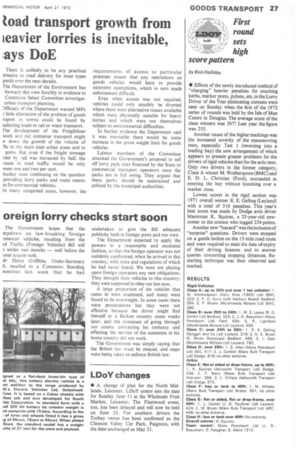toad transport growth from wavier lorries is inevitable, lays DoE
Page 29

If you've noticed an error in this article please click here to report it so we can fix it.
There is unlikely to be any practical :rnative to road delivery for most types goods over the next decade.
The Department of the Environment has : forward this view forcibly in evidence to Commons Select Committee investigaturban transport planning.
Dfficials of the Department warned MPs t little alleviation of the problem of goods asport in towns could be found by nsferring loads to rail or water transport. The development of the Freightliner work and rail container transport might w down the growth of the volume of 'fic in the main inter-urban areas and to ports. But even if the freight tonnage ried by rail was increased by half. the rease in road traffic would be only ween one and two per cent.
itudies were continuing on the question providing lorry parks and route restricis for commercial vehicles.
In many congested areas, however, the requirements of access to particular premises meant that any restrictions on goods vehicles would have to provide extensive exemptions, which in turn made enforcement difficult.
Even when access was not required, vehicles could only sensibly be diverted where there were alternative routes available which were physically suitable for heavy lorries and which were not themselves subject to environmental difficulties.
In further evidence the Department said it was inevitable there would be some increase in the gross weight limit for goods vehicles.
Labour members of the Committee attacked the Government's proposal to sell off lorry park sites financed by the State to commercial transport operators once the parks are in full swing. They argued that these parks should be maintained and policed by the municipal authorities.












































































































